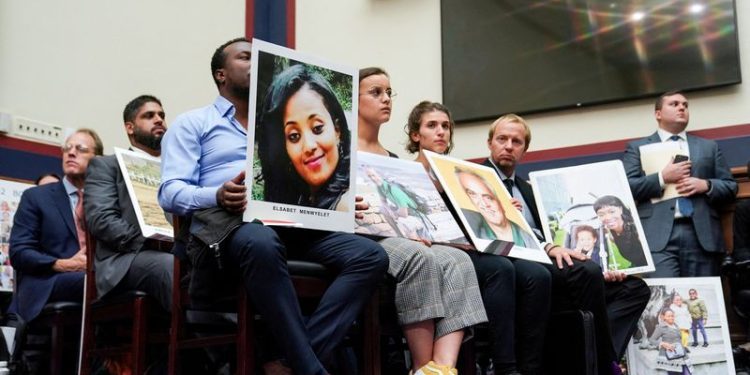By Mike Spector, Nate Raymond and Chris Prentice
(Reuters) – A Texas federal judge with a record of ruling in favor of conservative causes injected uncertainty into Boeing (NYSE:BA)’s agreement to plead guilty over two fatal 737 MAX plane crashes, seizing upon a single sentence in the deal about the U.S. Department of Justice’s diversity policy.
In an unexpected move, U.S. District Judge Reed O’Connor last week asked the parties to brief him by Friday on an element of the deal that says the DOJ will follow its “commitment to diversity and inclusion” when selecting an independent monitor to audit Boeing’s safety and compliance practices.
“It’s incredibly unusual for a judge to zero in on a DOJ policy related to DEI like this – particularly in a criminal case involving such a major corporation,” said Duncan Levin, a white-collar defense lawyer and former prosecutor, referring to policies commonly known as diversity, equity and inclusion.
O’Connor is weighing whether to approve the plea agreement between the DOJ and Boeing and has said he expects to rule soon.
The deal calls for the company to plead guilty to conspiring to defraud regulators in connection with the crashes, which killed a total of 346 people in 2018 and 2019. The sole reference to the DOJ’s DEI policy appears on page 26 of the 32-page agreement.
Families of the victims have filed briefs strongly urging O’Connor to reject the deal, saying it fails to properly hold Boeing and its executives accountable for the deaths of their loved ones.
They also objected to the provision that directs DOJ officials, with input from Boeing, to select the monitor. They briefly referenced the DEI policy but their court filings did not detail any concerns about it.
Chris Moore, whose 24-year-old daughter died in the 2019 crash of an Ethiopian Airlines flight, told Reuters he views the DOJ diversity provision as “a minor issue.”
Moore, a 61-year-old Toronto resident, opposes the plea deal for falling short on corporate accountability.
The current plea agreement gives Boeing “a do-over,” Moore said. “My daughter didn’t get a do-over.”
O’Connor did not respond to requests for comment. Boeing declined to comment. A DOJ spokesperson said the department would comply with O’Connor’s order and respond before the deadline.
Prosecutors contend they have charged Boeing with the most serious crime they can prove. Boeing agreed to take the plea deal in July after DOJ officials found it had breached a 2021 agreement shielding it from prosecution.
The U.S. planemaker has also contended with labor strife and faces scrutiny over an in-flight blowout in January that exposed ongoing safety issues.
FLASHPOINT IN CULTURE WARS
Judges weighing plea deals typically do not upend them over issues that the parties to the agreement have not disputed. In the rare cases that they do, it is usually because the judge wants to impose a different punishment than prosecutors have agreed to. In his Oct. 15 order requesting the briefs, O’Connor noted that Boeing did not object to the hiring of a monitor in accordance with the DOJ’s diversity policy.
O’Connor, appointed to the federal bench in 2007 by former Republican President George W. Bush, has gained prominence for rulings favoring conservative litigants challenging government policies, including finding Obamacare unconstitutional in a decision the U.S. Supreme Court later reversed.
In the past year, he has invalidated a Biden administration attempt to deter schools from discriminating against students based on gender identity or sexual orientation and separately slammed attempts to curb the practice of litigants suing in jurisdictions where they expect cases to be heard by sympathetic judges.
DEI policies have become a flashpoint in America’s culture wars, which refer to conflicts between liberal and conservative values. Supporters contend the policies combat unconscious bias, inequity and discrimination in hiring while opponents argue they focus on characteristics such as race and gender at the expense of core job qualifications.
Government institutions and corporations have increasingly adopted DEI policies aimed at ensuring candidates from underrepresented backgrounds are considered in hiring and other appointments.
The DEI issue has arisen before in the context of Boeing safety concerns. After a fuselage panel blew off a Boeing jet during an Alaska Airlines flight in January, Elon Musk suggested on his social-media platform, X, without evidence, that the planemaker prioritized DEI hiring over safety. Boeing declined to comment.
Josh Blackman, a conservative legal scholar at South Texas College of Law Houston, said O’Connor would be on solid ground rejecting the plea deal over the DEI provision, given the U.S. Supreme Court’s landmark ruling last year that barred universities from considering race in college admissions.
Some Republican-appointed judges, including O’Connor, have cited that decision in recent rulings holding that programs designed to increase diversity in U.S. businesses are racially discriminatory. “He’s not going to rubber-stamp a deal,” Blackman said.
But Levin, the former prosecutor, said he believes the issue of how the DOJ appoints monitors isn’t “enough to sink the plea agreement.” He said O’Connor is likely more interested in “taking a stand on this issue than in rejecting the plea on substantive legal grounds.”





